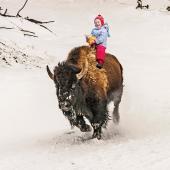Wellness in Wilderness
What do you envision when you think of “therapy”? If you’re like most people, you probably see a settee in a dimly lit room with “ocean sounds” coming from a CD player. Sound about right? While this is proven to be a beneficial environment for therapy, there is a growing body of research indicating that different settings can also promote therapeutic results. One of these is ecotherapy: a term used to define any application of nature—and the healing power of mountains, rivers, trails, and forests—as a core component to therapy and personal well being.
As Montanans, we fish, hunt, and bike; we garden, ride horses, and throw balls for our dogs. We all get outside to do different things, and although there are just as many reasons for why we do it, there’s a unifying theme: we truly love the outdoors and feel a strong connection to it. In our modern world of skyscrapers and cell phones, Montanans nonetheless continue to cherish their wild spaces and the peace of mind that comes with them.
This inherent attachment to the wilderness is a connection as old as humans themselves, and the evidence increasingly suggests that getting back to nature may be as powerful a therapeutic tool as any modern medicine. Ecotherapy is an all-encompassing idea that recognizes the importance of expanding people’s awareness of themselves and nature.
The average Joe doesn’t ski or fly fish with the sole purpose of mitigating depression. Rather, Joe does these activities to have fun, challenge himself, and connect with the great outdoors. But by engaging in activities in nature, Joe is unwittingly improving his mental health.
In a recent study conducted by Mind, a British mental health organization, respondents were asked to compare the differences between walking outdoors and walking in a mall—71% of those walking outdoors reported less depression. Research conducted at the University of Essex has shown that horseback riding, walking, running, and fishing all improve psychological well being. Regardless of the duration or intensity level, each activity was successful in enhancing mood and self-esteem, and reducing confusion, tension, anger, and depression.
Americans who participate in at least one outdoor activity on a regular basis experience physical and health benefits, according to a recent national study released by Outdoor Industry Foundation called “Exploring the Active Lifestyles.” The study found that 90% of Americans ages 16 and above believe that getting outside not only reduces their stress levels, but also provides them with a sense of accomplishment. The study also showed that 79% of people who participate in outdoor activities with their family feel that the activities strengthen their family relationships.
Human beings are meant to be outside—we’re not a species of cubicle-workers and mall-walkers. Many of us in Montana recognize the importance of the wilderness as it relates to our mental health, even if it’s just a sidebar to the surreal feeling of a fresh powder run off the Ridge at Bridger Bowl. This awareness is gaining national attention as evidence mounts in support of the importance of spending time in nature.
Photo by Tristan Dunlap












